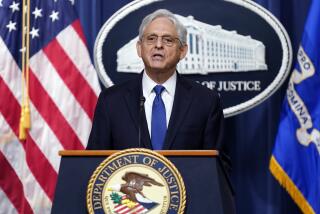Lawmaker Decries ‘Delay’ in Iraqi Loan Case Inquiry : Scandal: Rep. Brooks assails Justice Dept., saying chances for a special counsel may be in jeopardy.
- Share via
WASHINGTON — A Justice Department decision to conduct a preliminary inquiry into possible wrongdoing in an Iraqi loan case was characterized as a “calculated process of delay and denial” Monday by House Judiciary Committee Chairman Jack Brooks (D-Tex.).
The department should have taken the step months ago, Brooks suggested. By delaying, he claimed, Atty. Gen. William P. Barr may have jeopardized his chances of appointing an independent counsel to investigate, should the results of the preliminary investigation warrant one. The law authorizing such an appointment expires Dec. 15.
At the heart of the issue is whether the Bush Administration knew about or attempted to cover up $5 billion in illegal loans to Iraq by the Atlanta branch of the Italian-owned Banca Nazionale del Lavoro.
Brooks’ remarks came as Barr notified him and Senate Judiciary Committee Chairman Joseph R. Biden Jr. (D-Del.) that the preliminary investigation--the first step toward appointing an independent counsel--is being conducted on a compressed timetable to allow for its completion before Dec. 15.
Brooks’ denunciation contrasted with the reaction of the Senate Judiciary Committee, which welcomed the accelerated inquiry. A staff member noted that the alternative to an independent counsel would be an investigation by the Justice Department under the Administration of President-elect Bill Clinton.
Under the independent counsel provisions, Barr was required to notify the committees this week of his response to requests made last month by Democrats on both panels for appointment of an outside prosecutor in the case.
Government prosecutors have maintained that the $5 billion in loans--which helped fuel the Iraqi war machine--were made by the Atlanta branch manager without the knowledge of higher authorities. But others, including the bank manager, have insisted that Italian officials as well as some U.S. officials were aware of the loans and that they were in keeping with the Bush Administration’s policy of appeasement toward Iraq before the Gulf War.
Brooks’ reaction to the ordering of the preliminary probe illustrates that the issue of Bush Administration aid to the Iraq regime is not likely to lose its impact with the change of government.
Barr emphasized that he had asked Frederick B. Lacey, the retired federal judge he named to investigate the CIA and Justice Department’s actions in the loan case, to complete his preliminary inquiry by Dec. 8, rather than using the full 90 days allowed by law.
He said he did so to permit time for the appointment of an independent counsel if needed.
But Brooks claimed Barr had waited “until the last moment to take an action that he should have taken months ago.” Brooks contended that only investigations actually being conducted by an independent counsel appointed before the law expires Dec. 15 “will be preserved.”
Barr’s chief spokesman Paul McNulty said: “We have no doubt that should it be necessary (to seek appointment of an independent counsel) the special panel of judges who make the appointment could complete the process” in time.
After Democrats on Brooks’ committee had requested an outside prosecutor last summer, Barr denied the request on Aug. 10, saying such a prosecutor was not needed. In his letters to the committees, Barr said new events had prompted him to reconsider.
The “events” Barr referred to included the disclosure last month that the CIA had withheld from the Justice Department documents that indicate a wider knowledge by bank officials of $5 billion in secret loans to Iraq--contrary to the Justice Department’s theory that the Atlanta manager of the bank was chiefly responsible.
Brooks scoffed at Barr’s statement, noting that “four long months ago” Barr had been notified “of the possibility of criminal activity involved in the Iraq matter.”
More to Read
Get the L.A. Times Politics newsletter
Deeply reported insights into legislation, politics and policy from Sacramento, Washington and beyond. In your inbox twice per week.
You may occasionally receive promotional content from the Los Angeles Times.










